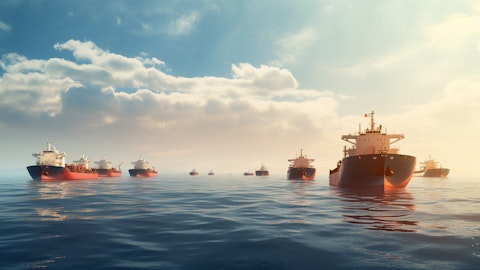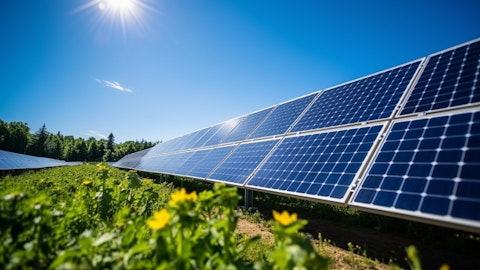KNOT Offshore Partners LP (NYSE:KNOP) Q2 2024 Earnings Call Transcript September 4, 2024
Operator: Good morning, everyone. Welcome to KNOP Second Quarter 2024 Earnings Call. My name is Kiki and I will be your conference operator today [Operator Instructions]. I will now hand you over to your host, Derek Lowe, Chief Executive Officer and Chief Financial Officer. Derek, please go ahead.
Derek Lowe: Thank you, Kiki. And good morning, ladies and gentlemen. My name is Derek Lowe, and I’m the Chief Executive and Chief Financial Officer of KNOT Offshore Partners. Welcome to the partnership’s earnings call for the second quarter of 2024. Our website is knotoffshorepartners.com, and you can find the earnings release there along with this presentation. On Slide 2, you will find guidance on the inclusion of forward-looking statements in today’s presentation. These are made in good faith and reflect management’s current views, known and unknown risks and are based on assumptions and estimates that are inherently subject to significant uncertainties and contingencies, many of which are beyond our control. Actual results may differ materially from those expressed or implied in forward-looking statements.
And the partnership does not have or undertake a duty to update any such forward-looking statements made as of the date of this presentation. For further information, please consult our SEC filings, especially in relation to our annual and quarterly results. Today’s presentation also includes certain non-US GAAP measures, and our earnings release includes a reconciliation of these to the most directly comparable GAAP measures. On Slide 3, we have the financial and operational headlines for Q2. Revenues were $74.4 million, operating income $1.3 million, and there was a net loss of $12.9 million. However, these figures notably include the effect of vessel impairments on our two Panamax vessels, the Dans. And if those are excluded, then operating income would be $17.7 million and net income $3.5 million.
Adjusted EBITDA was $45.5 million. We closed Q2 with $66 million in available liquidity, made up of $56 million in cash and cash equivalents plus $10 million in undrawn capacity on our credit facilities. We operated with 98.8% utilization and the vessel time available for scheduled operations was not impacted by any planned drydocking. Following the end of Q2, we declared a cash distribution of $0.026 per common unit, which was paid in early August. On Slide 4, we have headlines of the contractual and operational developments in our major market of Brazil, which cover both Q2 and the subsequent time. Carmen Knutsen saw signature of time charter with and all the major commencing Q1 2026 for four years fixed plus one year’s option. Dan Sabia was redelivered to us in July after a further extension to have bareboat charter with Transpetro and is now being marketed for work both in and outside of Brazil.
Tordis and Lena Knutsen both saw agreement with Shell to extend fixed periods by a year and that’s to Q3 of 2028. Shell also holds three further one year options on each of the Tordis and Lena Knutsen. And we’re excited to welcome the Tuva Knutsen into our fleet and will expand later on the terms of that acquisition, which completed yesterday. She comes with an existing contract with TotalEnergies, which has a fixed period lasting until February 2026. TotalEnergies holds options for a further 10 years after that as well. This purchase is from our sponsor, Knutsen NYK, who have provided a guarantee of the high rate for the next seven years, so that’s until Q3 2031. On Slide 5, we have headlines of the contractual operational developments in the North Sea, which cover both Q2 and the subsequent time.
Ingrid Knutsen went on to time charter with Knutsen NYK in April, pending delivery to Eni in October on the time charter lasting two years fixed with two further one year options. Torill Knutsen saw signature in July of the time charter with Eni, which we announced previously. This charter commences in Q4 this year and is for three years fixed plus three options each of one year. Repairs have now been completed on Torill’s broken generator rotor. We anticipate insurance cover subject to the usual deductibles and other terms and conditions for limits to the hire we were able to achieve and for the cost of the repair itself. Finally, Dan Cisne was sold to Knutsen NYK in conjunction with our purchase of the Tuva Knutsen, effectively making for swap of those vessels.
On Slide 6, we have the headline terms of this swap between Dan Cisne and Tuva Knutsen, which completed yesterday and is described more fully in the press release for that transaction as well as in our earnings release. The Tuva Knutsen was bought for $97.5 million less $68.6 million of net outstanding debt, which is made up of $69 million of gross debt less $0.4 million of capitalized financing fees. The net price was therefore $28.9 million. The Dan Cisne was sold for $30 million with no accompanying debt. The difference between these figures is $1.1 million and that was paid in cash by Knutsen NYK to the partnership. There will also be customary post deal adjustments relating to working capital. The transaction was negotiated on the partnership’s behalf by our Board’s Conflicts Committee, which is made up of directors who are independent of Knutsen NYK.
We’re delighted to complete this vessel swap as it provides fleet growth without the need for any new funding. It increases the pipeline of long term contracts, especially when the seven year guarantee is taken into account. It reduces the average fleet age and it helps to focus our fleet into the most in demand segment of the shuttle tanker market. It is, therefore, an important step towards growing certainty and stability of cash flows from long term employment with high quality counterparties. On to Slide 7, our outlook remains positive on both industry dynamics and the partnership’s positioning to participate fruitfully in our markets. Significant growth is anticipated in production fields which rely on service by shuttle tankers. We see reported newbuild orders from earlier this year as an endorsement of confidence in the sector and are aware of a total of 11 newbuilds on order.
Three of the vessels ordered earlier this year are for our sponsor Knutsen NYK for delivery over 2026 and 2027. Each of these sponsor vessels has a 10 year contract with Petrobras along with the client option to extend by a further five years. We would expect to see further newbuild orders placed in order to service the large new production volumes coming online in the years ahead. A measured amount of new shuttle tanker ordering is imperative and should not be understood as some sort of negative development for the sector. A material shortage of shuttle tanker capacity remains projected in the coming years. We do also remain mindful of the near term market conditions where we’re particularly focused on marketing the Dan Sabia and Hilda Knutsen.

In the meantime, the partnership remains financially resilient with a strong contracted revenue position of $773 million at the end of Q2 on fixed contracts, which average 2.3 years in duration. Charter’s options are additional to this and average a further 2.3 years. Our pattern of cash generation and liquidity balance is sufficient for our operations and the significant paydown rate for our debt. And we’ve demonstrated the strength of our relationships with lending banks via several refinancings completed over the last year. Finally, the average age of our vessels at 10.2 years places us well when compared with a useful life model of 23 years. On to Slide 8, you can see the consistency of our revenues over the quarters and years. This consistently applies also to our operating income when the effect of vessel impairments is removed.
Slide 9 similarly reflects the consistency of our adjusted EBITDA and you can find the definition of this non-GAAP measure in the appendix. On Slide 10, the most notable change in the balance sheet over the first half of 2024 has been a $68 million reduction in our liabilities, of which $52 million is in long term debt of over one year and a further $10 million in long term debt due for repayment within the coming year. This comes from our contractual debt repayment schedule, which in turn reflects our strong debt service capacity. Slide 11 sets out these long term debts where we provide added color around the dynamics of debt repayment. The highlighted column shows how the outstanding balances of each facility have been reducing because of the repayments that we’ve been making in line with scheduled repayment terms.
The current installments are the amounts of capital repayment due over the next year, which do not include interest. And the balloon payments of the final amounts of principal, which will be due on the maturity dates. Of note, $91 million is due to be paid on these debt facilities over the 12 months following 30th of June. The present, the next balloon repayments are due over August to November 2025. Our typical pattern is for our vessels to provide security for our debt facilities and that applies to 16 out of 18 vessels in the fleet as of the 30th of June. We had completed prepayments of the most recent loans secured by Dan Cisne and Dan Sabia and, of course now, Dan Cisne’s active fleet. New arrival Tuva Knutsen has brought $69 million of debt with a maturity in January 2027.
At present, Dan Sabia is the only vessel free of debt and we do not have any plans to incur additional borrowings secured by Dan Sabia until we have better visibility on her future employment. $861 million out of $901 million in debt facilities are secured by vessels while the two revolving credit facilities totaling $50 million of capacity are unsecured. Slide 12 shows the contracted pipeline in chart format, reflecting the developments I set out earlier, including from the Tuva Knutsen acquisition. Similarly, Slide 13 highlights the focus of our commercial efforts on adding near term contracts for Dan Sabia and Hilda Knutsen. We’ve made good progress in increasing our fixed charter coverage and we intend to remain active in that regard. On Slide 14, we see our sponsor’s inventory of vessels, which are eligible for purchase by the partnership.
This applies to any vessel owned by or on order for our sponsor where the vessel has a firm contract period at least five years in length. At present, four existing vessels and five under construction fall into this category. There is no assurance that any further acquisitions will be made by the partnership and any transaction will be subject to the Board approval of both parties, which includes the partnership’s independent Conflicts Committee. As we have said, our top priorities remain securing additional contract coverage for our existing fleet and fostering our liquidity position. On Slides 15 to 17, we have provided some useful illustrations of the strong demand dynamics in the Brazilian market as published by Petrobras. We encourage you to view Petrobras’ materials directly at the web page as shown there.
Primary takeaway from each of these slides is consistent. There is very significant committed demand growth coming in the Brazilian market in the form of new FPSOs that will require regular service from shuttle tankers. Two particular items that I would flag is indicative of the progress here. In recent days, Equinor announced that the long awaited Johan Castberg FPSO has set sail for the Barents Sea where it’s scheduled to begin operations later this year. And in Brazil, the FPSO Maria Quitéria scheduled its [indiscernible] to begin in 2025, has in fact already arrived in Brazil and is now guided to start up during 2024. There’s a great deal of production growth under development and it’s certainly encouraging to see these projects moving decisively forward.
We believe that reports earlier this year of additional vessel construction contracts are an endorsement of the strong anticipated market conditions in the medium and longer term. As I mentioned earlier, three of those recent newbuild contracts are for our sponsor, Knutsen NYK and are due for delivery over 2026 and ’27. We would expect to see further newbuild orders placed in order to service the large new production volumes coming online in the years ahead and the material shortage of shuttle tanker capacity remains projected in the coming years. On Slide 18, we provide information relevant to our US unitholders, in particular, those seeking a Form 1099. Those holding units via their custodians or brokers should approach those parties directly.
Those with directly registered holdings should contact our transfer agent, Equiniti Trust Company, whose details are shown there. On Slide 19, we include some reminders of the strong fundamentals of our business, in the market we serve, our assets, competitive landscape, robust contractual footprint and resilient finances. I’ll finish with Slide 20, recapping our financial and operational performance in Q2 2024 and the subsequent time and our outlook for the remainder of 2024. We’re glad to have delivered high and safe utilization, which have generated consistent financial performance. We are pleased with the new contracts and extensions we’ve secured during the quarter and since along with our ability to navigate our refinancing needs and periodic capital expenditure.
We’re particularly delighted to have taken the growth step of swapping the Dan Cisne for Tuva Knutsen. And our continued commercial focus remains on filling up third party utilization for the next 12 months while looking further forward to longer term charter visibility and liquidity generation. In total, though, we are making good progress and pleased to have established positive momentum against an improving market backdrop. Thank you for listening. And with that, I’ll hand the call back to the operator for any questions.
Q&A Session
Follow Knot Offshore Partners Lp (NYSE:KNOP)
Follow Knot Offshore Partners Lp (NYSE:KNOP)
Receive real-time insider trading and news alerts
Operator: [Operator Instructions] The first question we received is from Liam Burke from B. Riley.
Liam Burke: On the Dan Sabia, is that potentially an asset that can be redeployed at a favorable long term contract based on the end market or do you see possibly an alternative way to essentially divest the asset?
Derek Lowe: We’re actually looking at both. I mean, the market is strengthening so there’s always the potential for, as it were, a routine contract over the longer term. But we’re open minded as to what the best way to get value from Dan Sabia is going to be.
Liam Burke: And then it looks like the Brazilian market is starting to really step up in terms of the deployment of FPSOs. North Sea is obviously lagging there but are you satisfied enough that there’ll be enough activity in the North Sea to keep your vessel utilizations up?
Derek Lowe: We do expect so, yes.
Liam Burke: And then just very quickly, you have $176 million balloon next year. You’ve had a long history based on the quality of your assets of just refinancing. Is it all right to just presume that these things are already in process and you’re working with your banks on these?
Derek Lowe: Well, I think you need to make your own assumptions based on information available to you and particularly our track record. I would say it’s quite a long time out until the first of those three refinancings, so 11 months, isn’t it? So it would be unusual to start that sort of negotiation 11 months out. But we do have a practice of negotiating those a decent amount of time ahead of the refinancing.
Operator: The next question is from Poe Fratt from AGP.
Poe Fratt: Derek, can you just highlight on the Tuva what the balloon payments, how much the balloon payment is when it’s due in — what is it January of 2027, and then how much amortization you’re going to see annually?
Derek Lowe: The amortization schedule will look in line with what you’re used to seeing on other debt. We expect to provide more information in our own Form 6-K in a few weeks’ time, so the best place to look will be in there.
Poe Fratt: If you look at sequentially, your OpEx was down — or maybe G&A was down, OpEx was up. Can you just give me some color on how OpEx and G&A look for the rest of the year?
Derek Lowe: We’re not expecting material changes. I mean, there is generally an inflationary environment in much of the expenditure that we’re exposed to and similarly for our peers in the market as well. But we’re not expecting significant changes.
Poe Fratt: Help me understand the dynamic of agreeing to the one year extensions on the Tordis and the Lena and then giving three year options or three one year options behind those one year extensions. Given the outlook for Brazil, it seemed like maybe waiting a little bit for the market to really tighten up and availability to really decline but your leverage might have been higher doing that next year or the year after. Can you just help me just understand the thinking behind that and whether these options are also priced at higher rates than what the extensions were priced at?
Derek Lowe: We don’t comment on pricing of specific contracts and further I can’t expand on that. I would say that, of course, it’s a negotiation. And when your existing client is asking for terms, it will be on for time periods, which suit the production that they’re expecting.
Poe Fratt: And it looks like obviously, you have two right now, the Sabia, which you just talked about and then the Torill. I think the Torill’s up, the one that’s coming up in the North Sea, right or has availability. When do you expect to lock in something on that Torill?
Derek Lowe: I think you mean been the Hilda…
Poe Fratt: Yes, the Hilda…
Derek Lowe: We are pretty active in marketing and negotiation on both those vessels all the time. So they haven’t resulted yet in announceable transactions or announceable contracts, but we are working on those all the time.
Operator: [Operator Instructions] The next question is from Jim Altschul from Aviation Advisory Service.
Jim Altschul: Two questions, if I may. First of all, with regard to the Carmen, if I’m reading the chart correctly, the current term ends, I guess, at the end of the year or beginning of next year, and there is an option period for the first part of next year. By when does the charter need to notify you whether they’re going to exercise that option?
Derek Lowe: That’s going to be late in this year. I mean, the typical period can be as short as 30 days. I don’t have the exact figure at hand but it can be as short as that.
Jim Altschul: So that means — if they don’t exercise the option then you’ll have to make an alternate arrangement, right?
Derek Lowe: That’s right, yes.
Jim Altschul: The next thing. Can you summarize your current interest rate swap arrangements, do you have any swaps that are rolling off and ending in the near future?
Derek Lowe: In terms of size?
Jim Altschul: If you just look — can you summarize how many swaps you have in place and what those sizes and whether them are due to end in the near future?
Derek Lowe: Well, we actually have several of them and they tend to come in layers, so multiple tranches for each company or vessel that they relate to. And so at the moment, as we’ve disclosed, we’re paying just under 2% fixed on average on the swaps that are outstanding. And the maturity is — average maturity of those is 1.4 years. So if you look at what’s listed as Page 5 on our filing, you’ll be able to see the figures there.
Operator: Thank you. As we currently have no further questions, I will now hand back to Derek for closing remarks.
Derek Lowe: Thank you again for joining this earnings call for KNOT Offshore Partners second quarter and 2024, and I look forward to speaking with you again following the third quarter results…
Operator: I’m sorry, Derek. We just received another question from — would you like to take the question? So the next question is from Poe Fratt from AGP. He just dismissed his question, I’m afraid.
Derek Lowe: No problem. Okay. And are there any further questions?
Operator: No further questions.
Derek Lowe: Great. Thank you. Well, thank you, everybody, for joining. And I look forward to speaking with you again in about three months’ time. Thank you.
Operator: Thank you so much. This concludes today’s conference call. You may now disconnect your lines.
Follow Knot Offshore Partners Lp (NYSE:KNOP)
Follow Knot Offshore Partners Lp (NYSE:KNOP)
Receive real-time insider trading and news alerts





